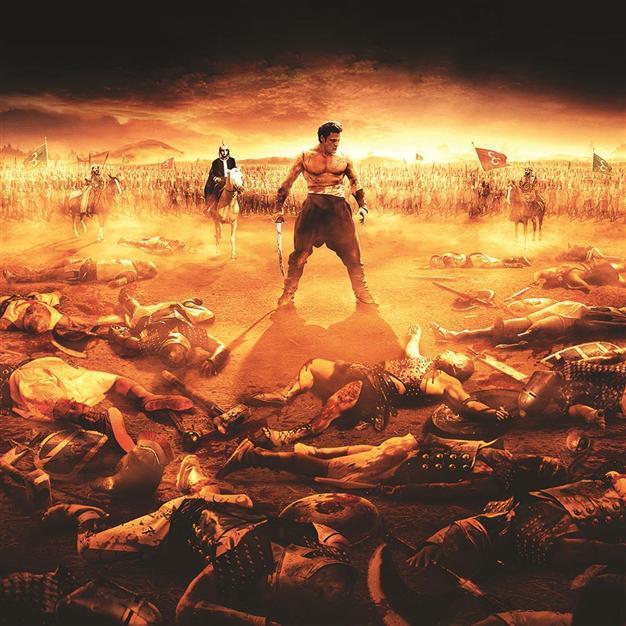Reflections of ‘new Turkey’ in historical drama ‘Kara Murat’
Emrah Güler

The differences between the new Kara Murat in ‘Fatih’s Guard Kara Murat,’ designed for the ‘new Turkey,’ and the original outweigh the similarities, if there are any.
Ottoman heroism is a regular fixture in Turkish cinema, rising from its ashes every couple of decades or so. And what better time to come back to life than when Turkey’s ruling Justice and Development Party (AKP) is unabashedly advocating neo-Ottomanism for a “new Turkey?” The recent release “Fatih’in Fedaisi Kara Murat” (Fatih’s Guard Kara Murat), directed by Aytekin Birkon, is the latest example to go with the neo-Ottomanism flow, adding a dash of neo-bullying along the way.The film is a half-baked attempt at reviving the 1970s’ cinematic hero Kara Murat, which in turn was an adaptation of the original comic books, created by artist Abdullah Turhan and writer Rahmi Turan, and first published in 1971 in the daily Günaydın. The “Fatih” in the name means the “Conqueror,” referring to the Ottoman emperor Mehmed II, who conquered Constantinople and put an end to the Byzantine Empire.
The hero of the comic books was a rogue fighter, bringing justice to the Ottoman court, and the enemy of the Byzantines. With his jet-black hair and mustache, he charmed his way into the beds of many Byzantine women. In the seven movie adaptations between 1972 and 1978, he was played by Cüneyt Arkın, an actor already popular in historical dramas with his rugged looks and elaborate stunts.
The early centuries of the Ottoman Empire proved to be a popular setting for Turkish cinema time and time again, especially in the 1960s and 1970s. The Byzantine Empire provided the ideal villains for these nationalist movies that didn’t much care for historical accuracy. Turkish nationalist comic books, like Kara Murat, Karaoğlan and Battal Gazi, were all adapted to screen one after the other.
A creativity splurge dominated Turkish cinema during that period when vikings, American indians and aliens made good villains, but Byzantines were the all-time favorite. Giovanni Scognamillo and Metin Demirhan’s reference book, “Fantastik Turk Sinemasi” (Fantastic Turkish Cinema) lists Aydin Arakon’s “Istanbul’un Fethi” (The Conquest of Istanbul) in 1951 as the first film to introduce a devious and scheming Byzantine who killed, tortured, and engaged in all sorts of debauchery as opposed to the virtuous Muslims.
‘New bullying’ for ‘new Turkey’
With Turkey’s present political atmosphere, the revival of the Ottoman historical dramas was imminent. More closer to the buff, pumped-up men of “300” than to the original, leaner protagonist of the comic books and the subsequent screen adaptations, the semblance of the hero of “Fatih’in Fedaisi Kara Murat,” played by Fatih Usta, to its source remains only in name.
The differences between the new Kara Murat for the “new Turkey” to the original outweigh the similarities, if there are any. The original hero was a rogue fighter, often behind enemy lines in disguise. He fought for the emperor but never obeyed him. In “Fatih’in Fedaisi Kara Murat,” he is the head guard of the sultan, but even the sultan is different - Mehmed II’s predecessor, Murad II. The original was a ladies’ man, bedding often more than one woman in each adventure. Here, Kara Murat is a devoted husband with a kid.
When “Fatih’in Fedaisi Kara Murat” was released, film critics unanimously smashed the movie into pieces, from its cinematography to its storylines, from the screenplay to the acting. In response, one of the co-producers of the movie, Murat Usta, took to twitter, showing the meaning of a sore loser and his affiliation in the process. “Who are you serving, you *** band of ‘çapulcu’s?” he wrote, “çapulcu” meaning “looter,” a derogatory term used by the then-Prime Minister Recep Tayyip Erdoğan for (and embraced by) the 2013’s Gezi Park protestors.
Calling the negative reviews part of a “bigger smear campaign,” Usta then wrote, “We are identifying those who are part of the campaign one by one. And we know whose interests they are serving.” His final tweet against the critics was the crown jewel: “We will crush you like flies.” The tweets were later deleted, but not before the screenshots were circulating on Twitter in the following days. The box office for the opening weekend wasn’t even close to the hype, viewed by only 64,000 people in nearly 200 theaters, probably a major source of Usta’s anger.
This is new bullying for the “new Turkey.”
















